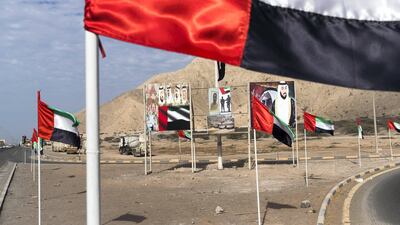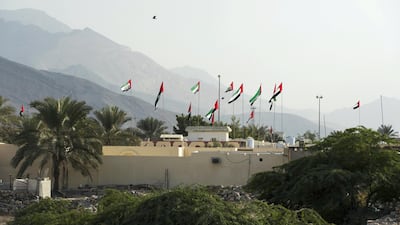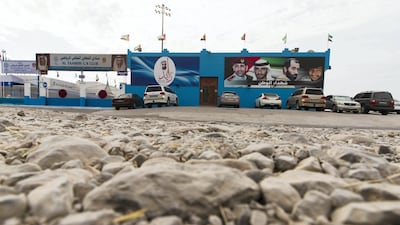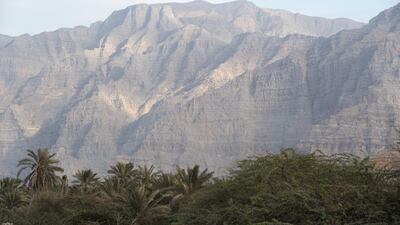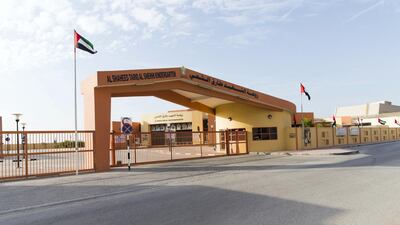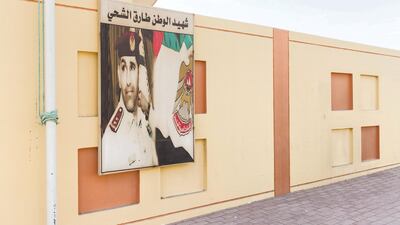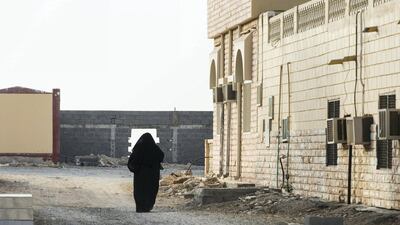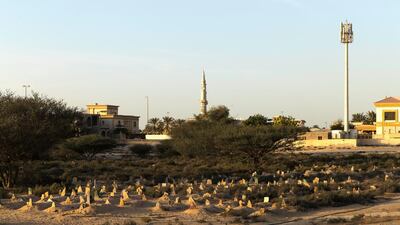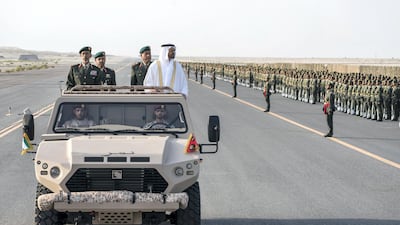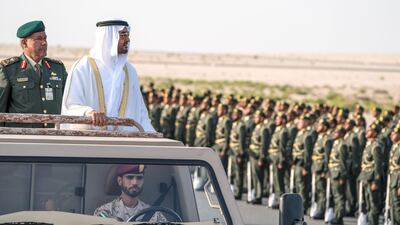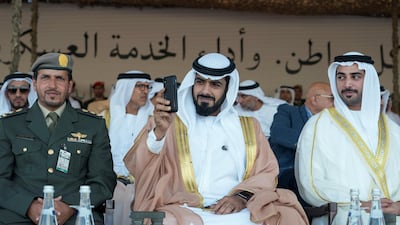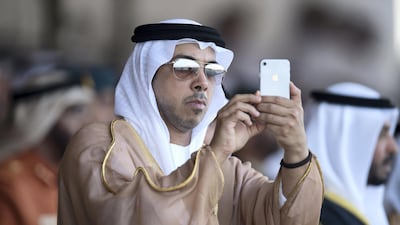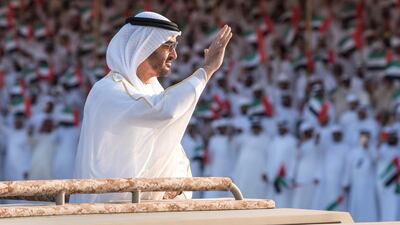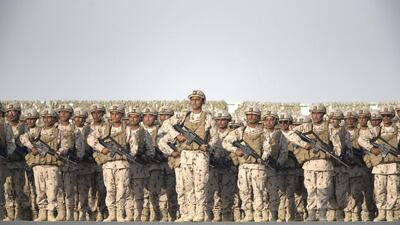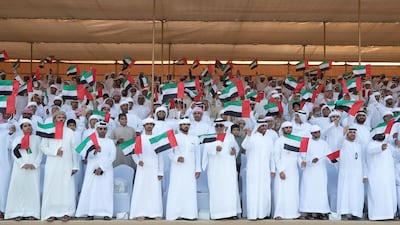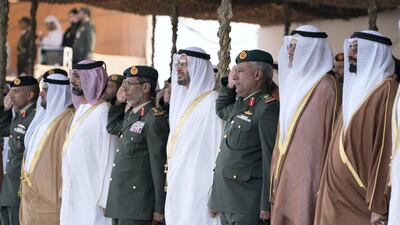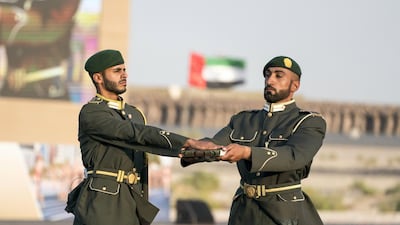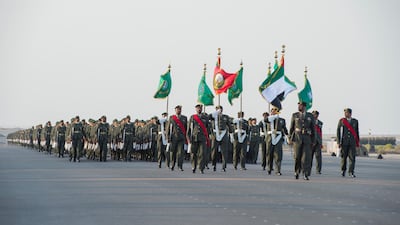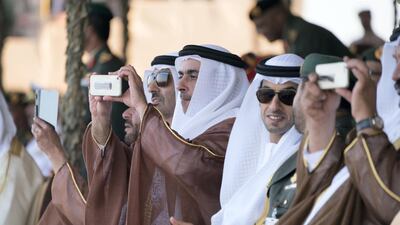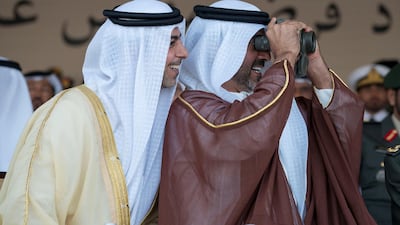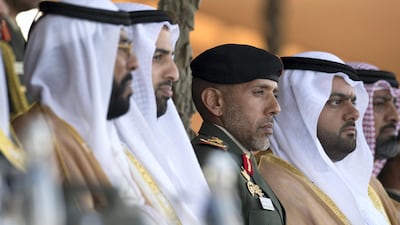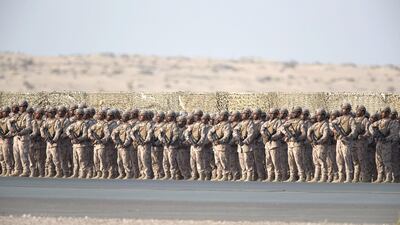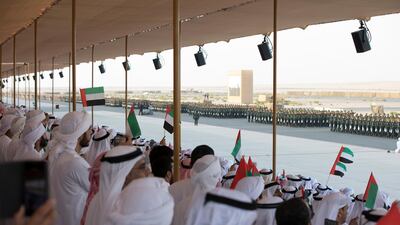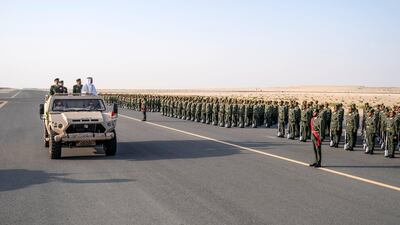Travel across the country and you will find that the sacrifices made by Emirati soldiers have left an imprint not only on their families and communities, but the very infrastructure of the UAE.
On the E11 motorway north of Ras Al Khaimah, the faces of those who have fallen in war are posted on signboards.
Along the east coast you will find mosques renamed after those who died in Yemen.
And in cities throughout the Emirates, streets, squares and football fields commemorate national servicemen, some made so by the governments and others by communities themselves.
Today is Commemoration Day, an occasion on which Emiratis and expats alike remember those who have died while serving the country. A minute’s silence will be observed at 11.30am.
Hundreds of martyrs’ families will travel to the Wahat Al Karama memorial in Abu Dhabi, where the names of all who have died in the service of the Emirates are etched into aluminum plates from armoured vehicles at the Pavilion of Honour.
Others will journey to Martyrs’ Square in Sharjah, where a 10-metre monument of golden cubes encases a minaret sculpture.
The cubes are inscribed with the Quranic verse: “Do not imagine those killed in the path of God to be dead. Rather, they are alive with their Lord, Enjoying His bounty.”
The role of the military has become increasingly central to national identity in recent years, all the more so since the introduction of mandatory National Service in 2014 and after the Arab coalition intervened in the conflict in Yemen two years ago to restore the internationally recognised government of president Abrabu Mansur Hadi.
_____________
Commemoration Day
Sheikh Khalifa: memory of Emirati martyrs will be eternal in UAE's consciousness
Editorial: we must never forget the stories of our heroes
_____________
This week The National visited some of the communities that have marked the sacrifice most proudly.
Setting foot in the Fujairah mountain town of Tawaeen, it is clear that talk of martyrdom and war has become a part of daily life in the village.
Children are raised learning the names of soldiers who died in service, and pray in mosques that bear their names. From a young age, children learn the prestige that comes with martyrdom from school, media, family and, now, infrastructure.
“This is an area of martyrs,” said Abdullah Mohammed, 56, a veteran, pointing at a road that connects his village of Tawaeen and neighbouring communities to Ras Al Khaimah and Dibba, Fujairah, which was renamed Martyrs Street in September 2015.
He spoke in the shade of a tree, outside one of three mosques named for martyrs from his community. Two of the men, Khalifa Mohammed Al Yammahi and Rashed Saeed Al Yammahi, died together in Yemen last summer. The third died in service in Egypt about two years ago.
The renaming of mosques is important to preserve their memory, Mr Mohammed said.
“We will always remember, whenever we read this sign we will remember this is a martyr. He was from this land,” he said. “It’s important of course because God chose him to become a martyr, in defence of the nation in defence of the people and for the sake of God.
“This man participated in the war only to protect his people, protect the people’s territories, the people’s property. God chose him for the privilege.
“A martyr dies for the sake of his country, his people and Islam.”
Sadness about martyrs’ deaths is absent from public discussion. Instead, people note that the Rulers travelled to different emirates to attend funerals and discuss the importance of assistance to neighbouring countries.
“Everyone should feel happy for this person to become a martyr because this is something greatly rewarded by God,” Mr Mohammed said.
Politics are broached only in the broadest of terms - assistance, protection, fighting terrorism.
Renamed mosques and road names are selected by the Government. But in some areas, the communities have made their own tributes.
The first of these appeared in Al Jeer, Ras Al Khaimah, in 2014, when the police officer Tariq Al Shehhi was killed in a bomb attack in Manama, Bahrain, where he was serving in a joint Gulf force.
Immediately, his photo was placed over the town’s sports club, the geographic and social heart of the community.
In the neighbouring town of Sha’am, a coastal road and a kindergarden were later named in his honour. His poster, one of several in the town, is outside the school gate.
“On the day that Tariq died, a field was named in his honour,” said Abdullah Al Shehhi, the head of Al Jeer’s Sports and Culture Cooperation Club.
“It was the beginning, a strong beginning of martyrs.”
Within a few years, other photos were put up alongside Al Shehhi’s photo.
North coast communities have traditionally been openly critical of local policy implementation, such as poor environmental regulation and infrastructure, and the most vocal in support for the federation and the Rulers.
It’s believed that the Ministry of Defence is the largest employer for men from this area and was long so before conscription was introduced.
Downtown Al Jeer is dominated by a signboard of four soldiers that hangs beside the gates of the sports club.
Each part of the club is named after a different man who died in service. There’s a field for Tariq Al Shehhi, a mosque for Rashed Al Dhuhoori, a field for Ahmed Al Shehhi and a cultural building for Abdullah Al Shamsi. All of these men played in the club.
Children see the photographs of these men every day, as they drive home from school or pass through the club’s gates for table tennis tournaments and ju-jitsu practice. It has been a positive influence, Mr Al Shehhi said.
“Our children say we want martyrdom to defend the nation,” Mr Al Shehhi said.
“The children are listening and learning about martyrdom, they are prepared. They’re listening to what the elders say.
“You can hear the children of the martyrs sometimes speaking on the radio, in the papers. They are saying they are proud and happy that their fathers are martyrs.”
The popularity of children’s uniforms is another physical manifestation of the new prominence of the military in civilian life, and has grown since the national holiday of Commemoration Day was introduced in 2015, initially called Martyrs’ Day.
On Commemoration Day, thousands of boys across the country will wear military fatigues. Instagram and social media feeds will fill with images of children and toddlers in uniform.
At a time of year when traditional markets are usually decked in the pan-Arab colours of the national flag, they are now lined with dresses sewn in military print and camouflage scarves and ghutras.
“Last year it was just for young children,” said the Keralite clerk Babu Deedika Valappil at Al Azhar Novelty, a ghutra and sandal shop at the Kuwait Street souq in Ras Al Khaimah. “Now it’s everyone.”
Whether it’s at a traditional market or shopping malls, anything branded with a UAE military theme sells, be it perfume, chocolates or children’s books. Violence and weaponry, however, are never depicted.
It is a sharp contrast to five years ago, when fatigues were strictly for servicemen on duty.
While the country has always maintained an active role in international affairs, its military role was not a prominent part of the public dialogue and national identity. For the entrepreneur, this newfound identity has translated into new marketing opportunities.
_____________
Commemoration Day
UAE mobile operators in tribute to fallen troops
As Commemoration Day approaches, the sense of loss feels closer to home
_____________
Images of military servicemen and their recognition on national infrastructure has contributed to the popularity of uniforms.
“It’s happening now because of the problems in the Gulf countries,” said Mohammed Al Shehhi, 33, a soldier and Kuwaiti Street shopper. “The people are tied to the Government and its leadership so it will keep developing. It must.”
Shihab Rashed, 14, had his uniform tailored two years ago, after his father died in Maarib, Yemen.
Shihab lives in the village of Ghailan, a cluster of houses at the base of the mountains just outside Ras Al Khaimah city. There is one road to the hamlet, marked by a signboard of Rulers from Dubai, Abu Dhabi and Ras Al Khaimah, a poster of fighter jets and one of Shihab’s father, Rashed.
“People see the picture of my father and they feel proud,” said Shihab’s sister Beshair, who is 18. “It encourages them to go to Yemen and help the people in Yemen.”
Their father had served for 25 years, with postings in Kuwait, Bahrain and Kosovo.
A new poster of the President, Sheikh Khalifa and the Founding Father, Sheikh Zayed, was raised recently beside the image of their father.
“The sheikh helps me a lot and is like a father,” said their elder sister Mouza, who is 20. “I don’t feel there is a difference.”
After their father’s death, Shihab decided he wanted a career in the military. Mouza is also considering enlisting.
“I think three or four years ago people didn’t have the same idea of the army but now they want to work in the army,” Beshair said. “For example, you can see my brother after my father’s death. You see my brother wearing the military uniform and waiting to go with them. When kids go to school they wear the uniform on Martyrs’ Day, Flag Day and National Day.
“It’s not just children,” she said. “On Instagram you can see more adults saying they want to go to Yemen. They need to protect the nation.”
